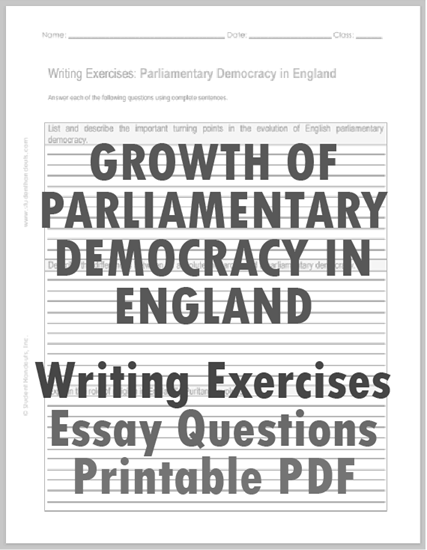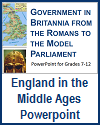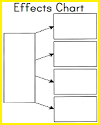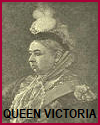| Writing Exercises on the Growth of English Parliamentary Democracy |
|---|
| www.studenthandouts.com ↣ World History ↣ English Parliamentary Democracy ↣ English Parliamentary Democracy Worksheets |
 |
    |
|
Answer each of the following questions using complete sentences.
1. List and describe the important turning points in the evolution of English parliamentary democracy. Key turning points in English parliamentary democracy include the Model Parliament (1295), which established representation of commoners; the Magna Carta (1215), which limited royal power; the English Civil War (1642-1651), challenging absolute monarchy; the Glorious Revolution (1688) and Bill of Rights (1689), securing parliamentary supremacy; and the Reform Acts (1832, 1867, 1884), which expanded suffrage. The Parliament Acts (1911, 1949) reduced the power of the House of Lords. 2. Describe the differences between an absolute monarchy and a parliamentary democracy. An absolute monarchy is a system where the monarch holds complete, unchecked power over the government and people, often ruling by divine right. In contrast, a parliamentary democracy limits the monarch's power through a representative body--parliament—elected by the people. Laws and decisions are made by elected officials, and the head of government is usually a prime minister, not the monarch, ensuring greater public participation and accountability. 3. Explain the role of religion in England’s Puritan Revolution. Religion played a central role in England's Puritan Revolution, also known as the English Civil War. The Puritans, a strict Protestant group, opposed the perceived Catholic practices of King Charles I and the Church of England. They sought to "purify" the church and promote moral reform. Religious tensions fueled the conflict between Parliament and the monarchy, ultimately leading to civil war, the king's execution, and a brief Puritan-led republic under Oliver Cromwell. Click here to print. Answers will vary. |
| English Democracy Books and Films | English Democracy Outlines and PowerPoints |
| English Democracy Maps and Pictures | English Democracy Study Games |
| English Democracy Miscellany | English Democracy Worksheets |
| www.studenthandouts.com ↣ World History ↣ English Parliamentary Democracy ↣ English Parliamentary Democracy Worksheets |














































